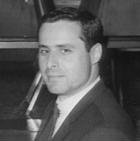
Peter Buxtun
Encyclopedia

United States Public Health Service
The Public Health Service Act of 1944 structured the United States Public Health Service as the primary division of the Department of Health, Education and Welfare , which later became the United States Department of Health and Human Services. The PHS comprises all Agency Divisions of Health and...
who became known as the whistleblower
Whistleblower
A whistleblower is a person who tells the public or someone in authority about alleged dishonest or illegal activities occurring in a government department, a public or private organization, or a company...
responsible for ending the Tuskegee syphilis experiment.
Buxtun, then a 27-year-old social worker and epidemiologist in San Francisco, was hired by the Public Health Service in December 1965 to interview patients with sexually transmitted diseases; in the course of his duties, he learned of the Tuskegee Experiment from co-workers. He later said—"I didn't want to believe it. This was the Public Health Service. We didn't do things like that." In November 1966, he filed an official protest on ethical grounds with the Service's Division of Venereal Diseases; this was rejected on the grounds that the Experiment was not yet complete. He filed another protest in November 1968; again, his concerns were ruled irrelevant.
In 1972, Buxtun leaked
News leak
A news leak is a disclosure of embargoed information in advance of its official release, or the unsanctioned release of confidential information.-Types of news leaks:...
information on the Tuskegee Experiment to Jean Heller
Jean Heller
Jean Heller is a writer and a journalist. She is known for her reporting on the Tuskegee experiment in 1972 and that the United States claims of an Iraqi buildup on the Saudi Arabian border during the Gulf War in 1990 was not accurate. She has reported for the St...
of the Washington Star
Washington Star
The Washington Star, previously known as the Washington Star-News and the Washington Evening Star, was a daily afternoon newspaper published in Washington, D.C. between 1852 and 1981. For most of that time, it was the city's newspaper of record, and the longtime home to columnist Mary McGrory and...
. Heller's story exposing the Experiment was published on July 25, 1972; It became front-page news in the New York Times the following day. Senator Edward Kennedy called Congressional hearings, at which Buxtun and HEW officials testified and the Experiment was terminated shortly thereafter. Buxtun subsequently testified at the ensuing Congressional hearing
Congressional hearing
Congressional hearings are the principal formal method by which committees collect and analyze information in the early stages of legislative policymaking. Whether confirmation hearings — a procedure unique to the Senate — legislative, oversight, investigative, or a combination of these, all...
.
In May 1999, Buxtun attended the launch of a memorial center and public exhibit to the experiment in Tuskegee
Tuskegee, Alabama
Tuskegee is a city in Macon County, Alabama, United States. At the 2000 census the population was 11,846 and is designated a Micropolitan Statistical Area. Tuskegee has been an important site in various stages of African American history....
.

